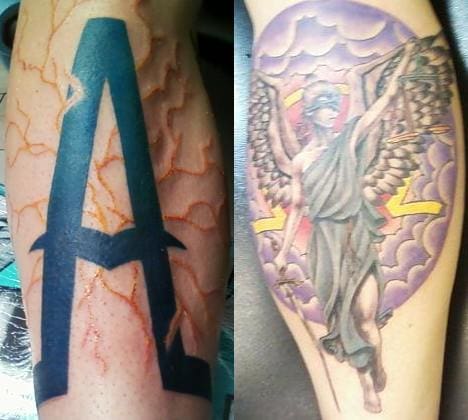I started getting tattoos before being a Christian. When I became a Christian, I never gave it a second thought and got a couple more, including a cross on my ribs. At one point, a friend told me that Christians weren’t supposed to get tattoos, which caught me a bit off guard because I had never heard that before. I disagreed with my friend after studying what the Bible says on the topic.
That conversation with my friend was almost 15 years ago, but in the past five years or so, I began to feel some cognitive dissonance regarding my tattoos. Below is an article I originally wrote in October, 2015 when I was getting what I thought was my last tattoo (a correction of a previous tattoo). I just got another to cover up one that didn’t really glorify God, so I thought it would be a good chance to update this article, especially since my views have become more nuanced.
Biblical Evidence
At first glance, it would seem like Leviticus 19:28 is definitive on the subject. The verse says “You shall not make any cuts in your body for the dead nor make any tattoo marks on yourselves.” So the question is settled right? Not quite. What is important here is the context. Making cuts on ones body is only prohibited “for the dead,” which most likely also applies to making tattoo marks. In other words, it’s saying don’t tattoo yourselves to honor or remember people who have died.
Additionally, verses 28:1-2 say “Then the LORD spoke to Moses, saying: Speak to all the congregation of the sons of Israel and say to them.” So it seems pretty clear that God is talking only to Jews in this verse. If not, and we take these verses to apply to Christians today, then we must also apply the rest of the chapter. This would mean that Christians cannot wear clothes made from mixed fabrics (v19), cannot eat anything with blood still in it (v26), and cannot shave their sideburns (v27). So to say it’s wrong to get tattoos leads a person to saying those other things are wrong too.
Another thing to keep in mind is the purpose of the OT law, which was to inform us about morality and provide a means of redemption when the law is broken. Jesus fulfilled the OT law, so that we do not have to pay sacrifices for not living up to the law, nor do we have to follow the specific laws that are meant for redemptive purposes. The only OT laws that that Christians are bound to obey are the moral laws, which are reaffirmed, at least in principle, in the NT.
There are a few NT verses that may apply to tattoos. The most apparent verses are all in 1 Corinthians. Verses 3:16-17, say “Do you not know that you are a temple of God and that the Spirit of God dwells in you? If any man destroys the temple of God, God will destroy him, for the temple of God is holy, and that is what you are” and verse 6:20 says “For you have been bought with a price: therefore glorify God in your body.”
Do tattoos destroy the body? I don’t know for sure, but it seems most likely that they don’t. They mark the body, but does that count as destruction? Do they or glorify God in the body? I don’t know, even for Christian tattoos. It’s easy to see how an interesting Christian tattoo can help bring someone to Christ (people ask me about mine all the time), but at the same time, it’s easy to see how they could turn people away from Christ and send the message that you’re not content with the body God created. Also, in 1 Corinthians 3, the plural form of “you” and the singular form of “temple” is used. Because of this, commentators typically say “you” is a reference to the collective body of believers and not an individual believer.
Based on these biblical passages that most directly address the topic, it is somewhat ambiguous. Therefore, we should consider 1 Corinthians 6:12 and 10:23, which both basically say that all things are permissible, but not all things are profitable. Since tattoos do not clearly break any moral laws, it would seem as though they are indeed acceptable. So the answer is yes, it is ok for Christians to get tattoos, assuming of course that they at least attempt to glorify God.
Practical Application
Even though tattoos are acceptable, are they beneficial for the gospel? I don’t think we can ever truly know if they will ultimately help or hurt our witness in the long run. I do know they are expensive and somewhat time consuming. On the one hand, they give some people a bad impression, but on the other hand, they give some people a favorable impression. I’m guessing as the number of tattoos goes up, the number of people who will have a bad impression of you will also go up, but that’s just an educated guess based on how people form judgments about others and the psychology of persuasion.
In my experience, I know some people see my tattoos and think they’re cool and ask me questions about them. This gives me an opportunity to share the gospel with them, but the conversations about God that stem from tattoos is not as robust as when people ask me about the apologetics shirts I wear. Probably because when people ask about a tattoo, they want to know about the tat, not God. I also know that some people see my tats and think they’re hideous, but this is less common with younger people.
If I could do it all over again, I wouldn’t get any tattoos. It’s not that I’m opposed to them or think they’re wrong; I just don’t care enough about tattoos to spend the time and money for them. Overall, I’ve sat in a tattoo chair for about 17 hours, plus additional time planning and designing my tattoos (they’re all custom designs), several weeks of restricted activities while my tats have healed, and I’ve spent between $1500 and $2000. Spending money isn’t bad if necessary or beneficial, but what’s the benefit for tattoos, especially if they’re mostly hidden under clothes like mine are?

The original alpha tattoo on my shin
and the omega tattoo on my calf
Since I already have tattoos, the only reason I have continued to get them is so that they can better glorify God. The alpha tattoo pictured tot he right healed poorly and so it was missing some big gaps of ink, but more importantly, people kept thinking it was an Air Force or Avenger’s tattoo. I had this one fixed by adding flames to one side and waves to the other so it would be more symbolic of creation and lead to more questions. Most recently, I covered up an old tattoo that represented a time in my past that just isn’t that meaningful anymore.
Conclusion
My first recommendation to anyone considering a tattoo is not to get one. There’s just better ways to spend your time and money. If you do get one, it should be to glorify God in some way. If you already have tattoos, you don’t necessarily need to cover them up or change them. I’ve left some of mine from before I was a Christian. They can be a good witness to how God has changed you, or you can have them covered up in order to bring glory to God. If your heart is in the right place, I don’t think you can go the wrong way.
P.S. Revelation 19:16 says “On his [Jesus’] robe and on his thigh he has a name written, King of kings and Lord of lords.” While I’d like to say this says Jesus had a tattoo, it is likely a symbolic reference to where a sword would hang and where artists would engrave their signature on a statue. It could also be a super awesome birth mark (but probably not 😃)!


